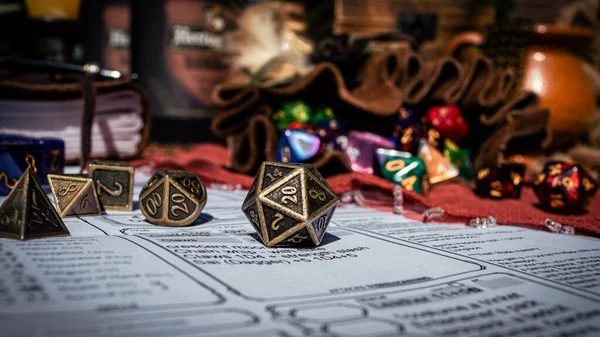In the last session of our North Watch campaign the party with some NPC allies assaulted Broken Spire Keep. It was a large and fairly chaotic battle with 9 characters on the players’ side and a total of 16 or so on Team Bad Guys. Because the party achieved at least partial surprise, the enemies were only able to come at them piecemeal and that meant the PCs were able to defeat each wave of enemies in detail. The fight was never really in doubt and the PCs won the day with relatively minor injuries.
Here’s the point to this particular post. There are numerous paths through this encounter where the PCs didn’t achieve surprise or didn’t bring along the extra help. In those scenarios, I would not have altered the encounter on the other side at all. If there were only 5 PCs, there still would have been 16 enemies of the same power level as before. If the PCs had failed to surprise the enemy then all 16 of them would have been available to fight the party from the outset. Some of these scenarios might have meant a PC died. Perhaps more than 1 PC died. Some of these scenarios might have meant the PCs lost the fight and were forced to retreat. In none of those instances would I have altered anything. I would have let it play out.
There’s a philosophy in modern RPG design that encounters, particularly combat encounters, should be balanced. This essentially means that the two sides of the fight should be on relatively equal footing in terms of power. Much like two sports teams must have the same number of players and follow the same rules in order to preserve fair competition. I don’t subscribe to this philosophy. I sometimes radically unbalance my encounters. Sometimes they are insanely difficult. Sometimes they are a cakewalk. The setting and the established fiction are what determines these things. I view combat not as a sport but as a war. Only a very bad military commander wants to fight a fair battle. Good commanders do everything in their power to stack the odds in their favor so that they can win in the most lopsided manner possible. The bad guys want to win just as much as the good guys and they are going to do everything in their power to do so. Thus… unbalanced encounters.
But why do this matter, you ask?
First, balancing encounters renders character advancement essentially moot. So your character has advanced from 1st to 5th level. Bob the Fighter now has a +5 to hit instead of +1 and can do 15 damage instead of 5 on average. That sounds great until you realize that all the encounters in the world have now gone up in power by essentially the same ratio. All the enemies now are harder to hit and have more health than before. You might be adding bigger numbers to your dice rolls but you still hit the same percentage of the time and it still takes you the same number of rounds to kill your enemies. The monsters have scaled with you so, in essence, nothing has changed. Unbalanced encounters mean you run into enemies that used to be difficult and your PCs cut through them like butter. That’s a cool feeling. New enemies are now at a comparable power level to you and your party can competently oppose them. However, there are still bad things out there that you actually encounter that can kill you without much of a fuss. That’s a much more interesting game, in my opinion. In the unbalanced game I get to see the results of my character’s advancement.
Second, it destroys the plausibility of the fictional setting. One of my primary jobs as a DM is to get my players to accept the world as a real place with real people in it that want real things. We all understand that this is all pretend but we need to accept it as real on some level in order for the drama to have consequence. We do the same thing with movies and books. We know that the stuff happening on the screen or page isn’t real but we pretend that it is in order to be engaged on an emotional level. When all encounters are level appropriate it breaks the illusion of the fiction by making the whole thing implausible. We know at a very basic level that isn’t how real places work. Real places have things that you can overpower and things that can overpower you all running around in them. You might encounter either. You should be cautious.
Third, balancing encounters discourages good planning. If players know that any encounter they have is balanced to the party’s level, then a proper plan isn’t really warranted. In fact, a proper plan is pointless. If the players make an awesome plan that really multiplies their combat effectiveness but then the DM simply increases the challenge level of the encounter to keep it balanced, then why did the players bother planning? Why not just kick the door in and take the frontal assault approach? After all, if the players choose a sub-optimal course of action, the DM is just going to lower the power level to compensate. No need to plan. It doesn’t accomplish anything. In the Assault on Broken Spire Keep referenced above, proper planning had the party bring allies and was rewarded by making the encounter significantly easier than it would have been. The tradeoff was that each PC got less Experience Points because they had to share with the NPCs that came along.
Someone reading this is probably thinking I just dump ancient dragons on my 2nd level party and then cackle as everyone dies. That’s not even close to true. Having unbalanced encounters requires some effort on my part. I have to telegraph the lethality of harsh encounters so the players have an opportunity to plan around it. It’s not fun when something beyond your capabilities is forced down your throat as a player. I also encourage my players to do reconnaissance and to gather information. This way they know where the hard things are and can make plans to deal with them. Finally, I make sure give the players the benefit of the doubt when adjudicating their non-combat options to deal with hard encounters. I try very hard not to have an overwhelming encounter be forced into violent conflict. Negotiation and subterfuge should almost always be options.
Anyway, that’s how I deal with encounter balance. I mostly don’t.


